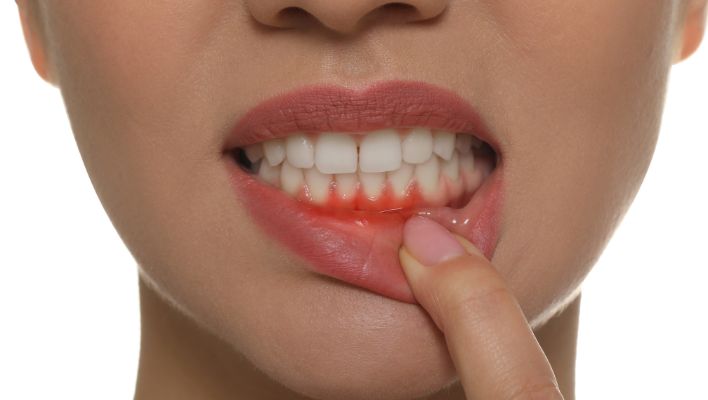Having a tooth infection is not something that you want to have. A tooth infection can cause a lot of pain and make it difficult to do anything. Either in the gym or just sitting at home, you can’t do your workout if you have a tooth infection. This is because your body will not be able to handle the strain. In this case, if you are unsure if you have a tooth infection before you begin a workout, it’s important to properly assess your condition and consult with your doctor.

What is a Tooth Infection?
A tooth abscess is an infection that begins in the tooth’s pulp. The pulp contains nerves and blood vessels. It can also cause pain and swelling of the gums.
Symptoms Of Tooth Infection

The common symptoms of a tooth infection can vary depending on the severity of the infection, but some of the most common signs include pain, swelling, fever, etc.
Pain: The most common symptom of a tooth infection is pain. This pain can range from mild to severe depending on the severity of the infection. It is usually felt when biting down on the tooth, chewing food or drinking hot or cold beverages. It is important to note that the pain can also spread to other parts of the face, such as the ear, jaw, neck, and even the temple.
Swelling: Another common symptom of a tooth infection is swelling. This may be seen in the gums around the infected tooth, as well as in the face and neck. Swelling can occur due to an accumulation of pus and fluid in the surrounding tissues. In severe cases, the swelling can be so severe that it can cause difficulty breathing.
Fever: The fever is another symptom of a tooth infection. This is caused by the body’s immune system fighting off the infection. A fever can range from mild to high, depending on the severity of the infection. It is important to seek medical attention as soon as possible if a fever is present, as this could be a sign of a serious, underlying condition.
Other Symptoms: Other symptoms of a tooth infection can include bad breath, a bad taste in the mouth, and sensitivity to hot and cold. If any of these symptoms are present, it is important to visit the dentist to determine the exact cause and to get the proper treatment.
Gritting your teeth hard

Gritting your teeth hard while working out with a tooth infection isn’t the best way to improve your health. It can cause your teeth to become cracked and can make it harder to open your mouth. It can also cause jaw pain. If left untreated, bruxism can result in chronic toothache, periodontal disease, and tooth loss.
Teeth grinding is a condition that is associated with stress. You may not even realize that you’re clenching your teeth, but it’s widespread.
Treatment of teeth grinding
In order to reduce your risk of teeth grinding, you should minimize your stress. Stress management techniques, such as deep breathing, exercise, and stress counseling, can help. You should also avoid chewing on non-food items like gum. This may not only cause you to grind your teeth but also to clench your jaw.
Bruxism
Bruxism is a habit of grinding the teeth involuntarily. This can lead to painful teeth and other dental problems. It affects millions of people worldwide.
There are different causes of bruxism. Genetics, illnesses, stress, and personality factors can all be considered factors. However, the exact cause of bruxism is still unknown.
Treatment: Some researchers have found a link between bruxism and the use of certain medications. SSRIs and fluoxetine (Prozac) are thought to be the most common culprits.
Bruxism may be worse with the consumption of alcohol or caffeine. Other factors that may increase the risk of bruxism include smoking, stress, and malocclusions.
People who suffer from sleep disorders such as sleep apnea, malocclusion, and Parkinson’s disease are also susceptible to bruxism. Patients with these conditions may self-equilibrate their teeth to correct their bite.
Dry socket
Having a tooth infection can be a traumatic experience. However, knowing the risks and ways to avoid them is crucial. There are ways to manage your pain until your dentist is ready to see you.
Keeping your mouth clean will help reduce the risk of infection. The more debris in your mouth, the less blood is available to heal the socket.
Reduce the risk of infection: After having a tooth extracted, following your dentist’s instructions is essential to avoid infection. This includes cleaning your mouth and rinsing it thoroughly. The dentist may also prescribe antibiotics to prevent infection.
Keeping your mouth clean will help reduce the dry sockets’ risk. In addition to cleaning, a warm compress can be applied to the jaw bone. This will help reduce swelling and pain.
Sinus infection
Having a sinus infection can be a frustrating experience. You may feel like you don’t have the energy to exercise, or you might be worried about the potential side effects. However, exercise can be a great way to help clear your sinuses and stay healthy.
Solution: A good exercise for sinus infection involves light aerobic activity, such as a brisk walk. You can also try yoga, which can help you relax and improve your breathing.
It’s also important to drink plenty of water. You should drink twice as much water as you usually do. You may also want to consider using a humidifier, as well. A humidifier can help relieve your sinuses by providing a cool mist. You should also clean your humidifier regularly to prevent bacteria from building up.
Dental abscess
A dental abscess is painful, but it can be treated by a dental professional. In fact, it is often necessary to have a tooth extraction and then have a dental implant to cure the underlying infection.
Dental abscesses are caused by bacteria that infect the tooth. This infection can cause severe pain and spread to other body parts. Symptoms can include a fever, difficulty swallowing, and difficulty breathing.
Some dental abscesses can be treated on an outpatient basis. However, if the infection has spread to other body parts, it may require hospitalization. The condition is also dangerous because it can cause problems with the heart, brain, and other organs.
How To Prevent Tooth Infection?

The most important thing you can do to prevent tooth infection is to brush your teeth twice a day with fluoride toothpaste. This habit will help to remove any bacteria that may be present on your teeth and help to prevent cavities. Additionally, flossing your teeth and using an antibacterial mouthwash can help to reduce the chances of a bacterial infection.
It is also important to visit your dentist regularly for check-ups and cleanings. During your visit, your dentist will check for any signs of infection and clean your teeth to help prevent cavities and other issues. Regular dental visits also allow your dentist to monitor any changes in your oral health and provide treatment if needed.
Besides brushing and flossing your teeth, it is essential to maintain a healthy diet. Eating a balanced diet that is low in sugar and carbohydrates can help to reduce the risk of developing cavities. Additionally, avoiding foods that are high in sugar and acidic can help to reduce the chances of a bacterial infection.
If you do develop a tooth infection, it is important to seek treatment right away. Treatment may include antibiotics, root canal, or extraction. The longer the infection is left untreated, the more serious the problem can become more serious. So, it is a must to take steps to prevent a tooth infection before it becomes a major issue.
So, is it OK to workout with a tooth infection?

Doing workout while having a tooth infection is generally not recommended, as it can increase the risk of further complications. A tooth infection, also known as an abscessed tooth, is caused by bacteria that gets into a tooth or the surrounding gums and causes an infection. This bacteria can spread from the mouth to other parts of the body, including the heart and lungs, if left untreated.
When a person has a tooth infection, it is important to seek treatment from a dentist as soon as possible. During the treatment process, it is important to avoid activities that can lead to further complications, such as intense physical activity, as this can increase the risk of the infection spreading.
If a person has a minor tooth infection and is feeling well enough to exercise, it is important to take precautionary measures, such as avoiding contact sports or high-impact activities. Additionally, it is important to maintain good oral hygiene by brushing and flossing regularly and avoid any activities that could cause further damage to the tooth or cause the infection to spread.
In conclusion
It is important to seek treatment from a dentist as soon as possible if a person is experiencing a tooth infection. While low-impact activities may be possible with a minor infection, it is mandatory to avoid any activities that could cause further damage or spread of the infection.





